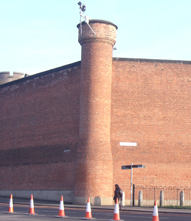Prisons are unacceptably violent and dangerous, according to Peter Clarke, Chief Inspector of Prisons, in his first annual report. Reported assaults on prison staff for the 12 months to December 2014 totalled 3437, with 461 termed serious; this rose in the 12 months to December 2015 to 4730, and 602. The report pointed to synthetic drugs as a growing problem. Gangs and bullying related to debts also featured. In almost two-thirds of inspected prisons, the use of force was increasing and/or high, according to the report. “In many prisons we were not assured that all cases were warranted, proportionate or de-escalated quickly enough.”
National Offender Management Service (NOMS) and Ministry of Justice (MoJ) data showed that:
– during 2015 there were over 20,000 assaults in prisons, an increase of 27 per cent over the previous year;
– serious assaults have risen by 31pc, up to nearly 3,000;
– the number of apparent homicides between April 2015 and March 2016 rose from four to six;
– there were over 32,000 incidents of self-harm in 2015, an increase of 25pc on the previous calendar year; and
– the total of 100 self-inflicted deaths between April 2015 and March 2016 marks a 27pc increase.
Peter Clarke said: “Despite the sterling efforts of many who work in the Prison Service at all levels, there is a simple and unpalatable truth about far too many of our prisons. They have become unacceptably violent and dangerous places. A large part of this violence is linked to the harm caused by new psychoactive substances (NPS) which are having a dramatic and de-stabilising effect in many of our prisons.
“The effects of these drugs can be unpredictable and extreme. Their use can be linked to attacks on other prisoners and staff, self-inflicted deaths, serious illness and life-changing self-harm.”
On a national level, the authorities do not yet have an overall national strategy for dealing with the problem of NPS. Mandatory drug testing remained an ineffective deterrent due to the very limited range of drugs it could test for, according to the report. Drug-fuelled instability has restricted the ability of staff to get prisoners safely to and from education, training and other activities. This has implications fo reform, education and rehabilitation he suggested.
Peter Clarke said that the three issues of violence, drugs and mental health, on many occasions, find themselves intertwined. “They are, in turn, compounded by the perennial problems of overcrowding, poor physical environments in ageing prisons and inadequate staffing.”
Early in 2016, allegations emerged in a BBC Panorama TV documentary of mistreatment and abuse of children at Medway secure training centre, run by the contractor G4S. A team from HMI Prisons and Ofsted was deployed.
From April 2015 to March 2016, the Inspectorate published 75 individual inspection reports on prisons, police custody suites, immigration removal centres and other custodial establishments. Thematic reports were published on substance misuse in adult prisons, the restraint of children in custody, court custody, the Close Supervision Centre system, failures of Release on Temporary Licence (ROTL), and prison communications. Joint thematic reports were published on children in custody and the needs of victims in the criminal justice system.
Clarke said: “Despite the troubles that afflict prisons at the moment, there are large numbers of dedicated, courageous, skilful and experienced staff who care deeply about the safety of those in custody, who want to improve the conditions of detention, and are focused on the rehabilitation of prisoners. Thanks to their efforts there are countless examples of good practice to be found in all places of detention. All too often this good practice fails to gain the recognition it deserves. I have asked inspectors to pay particular attention to good practice and to make specific mention of it in reports.”
Pictured: Leicester Prison.
Since that report, a report followed on an unannounced visit to HMP Swaleside, a training prison on the Isle of Sheppey in Kent. Inspectors were concerned to find that levels of violence were too high and many incidents were serious – 69 per cent of prisoners surveyed said they had felt unsafe at some time; the use of force was high and the documentation associated with its use and justification was totally inadequate; half, 52pc of prisoners surveyed said it was easy to get drugs at the prison, and 45pc said the same about alcohol. The inspectors suggested that violence was under-reported. At the last inspection there had been a total of 41 assaults reported on prisoners and staff in the previous six months; there were 87 in the same period before this latest inspection.
About NPS
Briefly, NPS or synthetic drugs are new drugs that are developed or chosen to mimic the effects of illegal drugs such as cannabis, heroin or amphetamines and may have unpredictable and life threatening effects.










